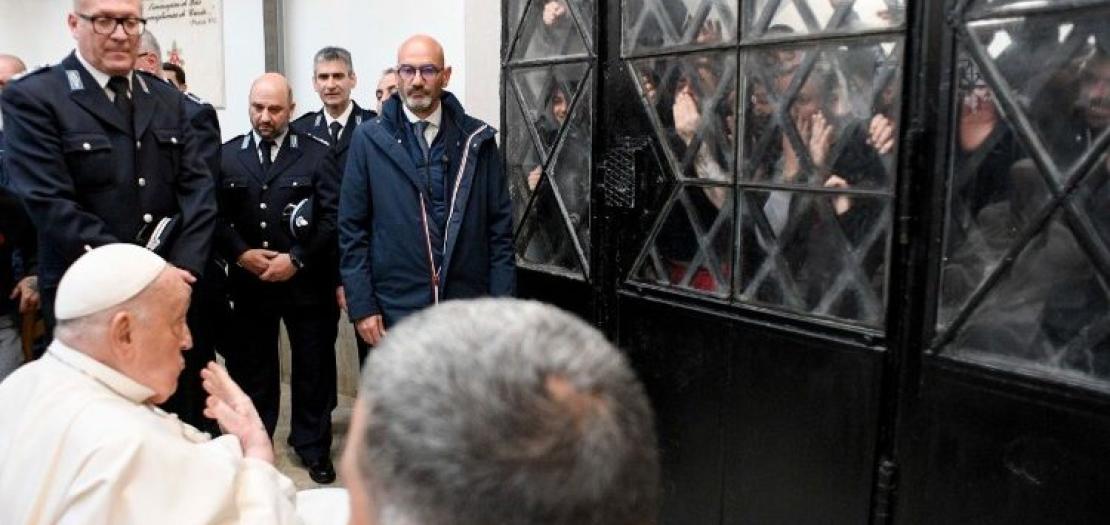Issued by the Catholic Center for Studies and Media - Jordan. Editor-in-chief Fr. Rif'at Bader - موقع أبونا abouna.org

Last week, the Catholic Church lost its faithful pastor and visionary leader. And the world lost its most persuasive champion to end the scourge of capital punishment. I remember exactly where I was when Pope Francis addressed the U.S. Congress in September of 2015. I had just deboarded my train arriving at Penn Station in New York. Standing inside the station and watching the simulcast, I was transfixed by the live feed, hanging on to the Holy Father’s every word. Pope Francis called on Americans to emb
Last week, the Catholic Church lost its faithful pastor and visionary leader. And the world lost its most persuasive champion to end the scourge of capital punishment.
I remember exactly where I was when Pope Francis addressed the U.S. Congress in September of 2015. I had just deboarded my train arriving at Penn Station in New York. Standing inside the station and watching the simulcast, I was transfixed by the live feed, hanging on to the Holy Father’s every word.
Pope Francis called on Americans to embrace our highest ideals and to pursue the common good. Yet no line touched me as powerfully as when he made a specific call to end the death penalty in the United States.
It was a powerful, historic moment. Pope Francis was the first Pope to formally address Congress, seizing this opportunity to single out an issue that, for many, still resided within a loophole of disclarity on the continuum of life issues.
Abolitionists cheered, while supporters of the death penalty pushed back. This moment was significant in 2015, but it is only now, after Pope Francis’ passing, that we can fully grasp its importance.
Pope Francis gave Congress, and us, a glimpse into one of the central tenets of his papacy—prophetic and unequivocal action against the death penalty, including and especially promoting its abolition in the United States.
The Catholic Church has long seen the death penalty as incompatible with the consistent ethic of life. In the United States, the injustice is compounded by widespread racial bias, grotesque botched executions, an arbitrary and capricious application, and the reality that innocent people have been sentenced to death.
It is therefore not surprising that Pope Francis would challenge Americans to end this unjust practice. As the head of the universal Church, Pope Francis was also thinking globally. In 2015, global executions were at a 25-year high. American abolition would send a message to the international community setting a key precedent for other nations to follow suit.
Through his congressional address, the Pope sought to inspire the millions of American Catholics, who comprise 22% of the U.S. population, to drive this push for abolition. The U.S. Conference of Catholic Bishops and my organization, Catholic Mobilizing Network, were already working hard to advance key arguments against the death penalty and break through the polarization that divides American Catholics.
With countless Catholic public servants in key positions, a new openness to hearing the moral and practical arguments against the death penalty could prove decisive.
Following his 2015 visit, and throughout the next presidential administration, Pope Francis continued to take unparalleled action. He revised the death penalty section of the Catholic Catechism, the core teaching of the Catholic Church, calling the practice “inadmissible” in all cases.
The Pope’s adjustment to Church teaching was a natural progression in line with his predecessors’ efforts to expand the protection of human life, but it was also bold and absolute, eliminating any ambiguity about the Church’s position and contributing to real change; four states abolished the death penalty in four consecutive years—with Catholics playing a central role in these efforts in New Hampshire and Virginia.
At the same time President Trump reinstated federal executions in 2020, Pope Francis released his third encyclical, Fratelli tutti, which included a section decrying the injustice of the death penalty and calling for its worldwide abolition. The encyclical affirmed the Catechism revision, placing the full weight of Pope Francis’ teaching authority behind the Church’s anti-death penalty position.
Furthermore, the Holy Father sent letters to U.S. Presidents and Governors asking them to commute their death rows; he sent thank-you letters when they did; and he even dedicated a Church-wide month of prayer to the goal of global abolition.
In this historic Jubilee Year 2025, Pope Francis called Catholics around the world to “be one in demanding dignified conditions for those in prison, respect for their human rights and above all the abolition of the death penalty, a provision at odds with Christian faith and one that eliminates all hope of forgiveness and rehabilitation.”
And in the final days of the Biden Administration, in his weekly Angelus on December 8, 2024, Pope Francis stood before the world and urged federal death row commutations in the United States. Later that month, President Joe Biden commuted the sentences of 37 of the 40 people on death row. No president in the history of the United States had ever taken such an action.
For Pope Francis’ legacy to be fully realized, American Catholics and all who admire the Pope’s courageous moral leadership must continue to pursue human dignity.
Will we rise to this challenge by abolishing the death penalty, and honoring the legacy of a Pope who believed in our capacity for mercy?







